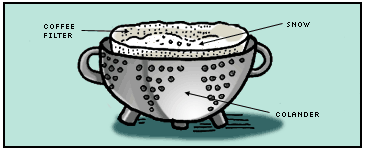
Measure a Snowball
[20 Minutes]
You may be interested in measuring the snowfall in your area. On Mt. Washington, the highest peak in the Northeast, snowfall is measured in a galvanized bucket. The snow in the bucket is melted down to determine the water equivalent. The bucket is changed every six hours. You and your child may want to try this at your house during the next snow storm. Discover how much water is in snow!
You'll need:
• colander or strainer • coffee filter • scoop of snow • bowl • measuring cup • galvanized bucket (optional)
What to do:
- If possible, print out these directions. Read them through with your child.
- With your child, gather everything you'll need.
- Ask questions about snow, such as: What happens when snow melts? Is there anything left? What do we know about snow?
- Let your child make a small snowball and place it in a colander or strainer lined with a coffee filter. Place the colander over a bowl.
- Periodically, check on the progress of the melting snowball.
- Together, observe what is left in the filter.
- Invite him to pour the water from the bowl into the measuring cup to see how much liquid is in the snowball.
- After one observation, predict how much water will be in another snowball. Vary the size of the snowballs and compare the results.
Let's Talk: Ideas to Explore Together.
- How much water do you think is in a snowball?
- Why do you think meteorologists measure snowfall?
- Can you think of other ways to measure snowfall?
Useful information:
Snowflakes are crystals of ice that are clustered together. The clusters usually gather around dust or chemicals in the air. Therefore, when snow melts, water should be left behind. Snow acts like an insulator to small plants in the winter by keeping them safe from the extreme cold. In the spring, when the snow melts, the water feeds rivers and lakes providing water for animals to drink.
|